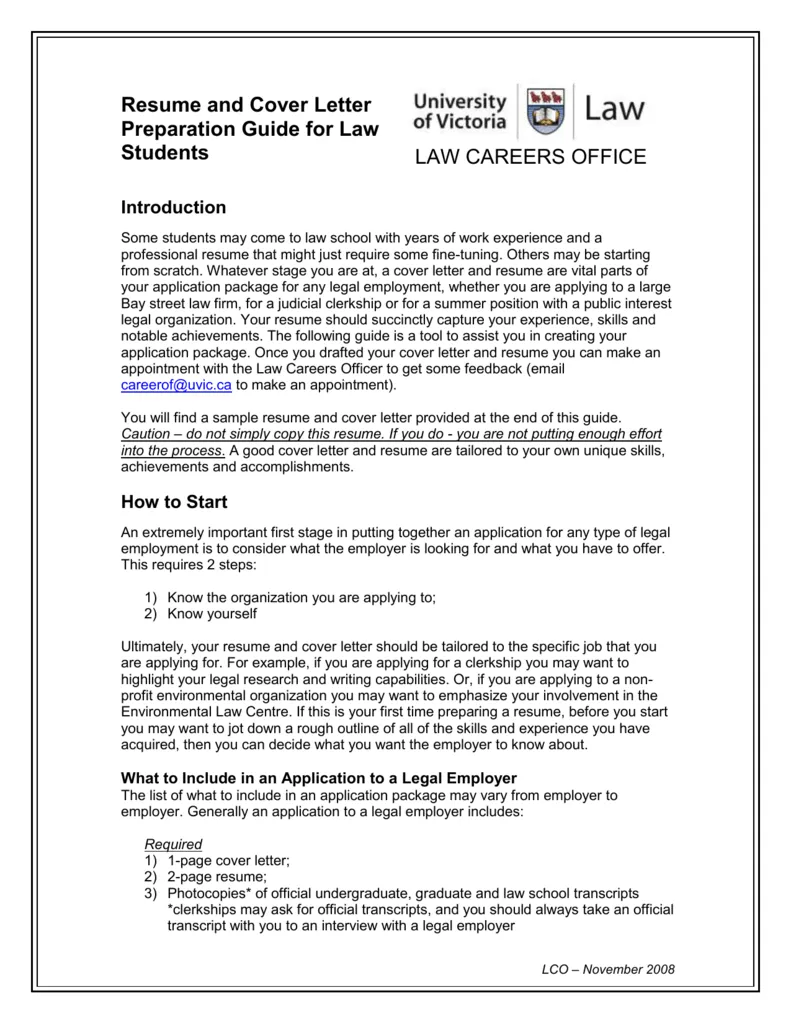Understanding the Importance of a Cover Letter
As a law graduate, your resume is essential, but a well-crafted cover letter can significantly boost your chances of landing your dream job. It is your first opportunity to introduce yourself to a potential employer and make a lasting impression. Think of it as your personal introduction, allowing you to showcase your personality, passion for law, and how your skills align with the specific role and the firm’s values. It’s a crucial tool that helps you stand out from other applicants who may have similar qualifications. A strong cover letter is your voice, providing context and depth to your resume. It is where you can highlight your unique qualities and explain your career aspirations, setting the stage for a successful legal career.
Why a Cover Letter Matters for Law Graduates
The legal profession values strong communication and attention to detail, and a cover letter offers the perfect platform to demonstrate these skills. Unlike a resume, which lists your qualifications, a cover letter allows you to tell a story about yourself, demonstrating your motivations and career goals. It shows your understanding of the specific job requirements and the firm’s culture. Moreover, it enables you to address any potential gaps in your experience or explain any career transitions. It’s an opportunity to express your enthusiasm for the role and the firm, setting you apart from candidates who only submit a resume. A well-written cover letter signals your professionalism, initiative, and dedication to succeeding in the legal field.
Key Components of a Compelling Cover Letter
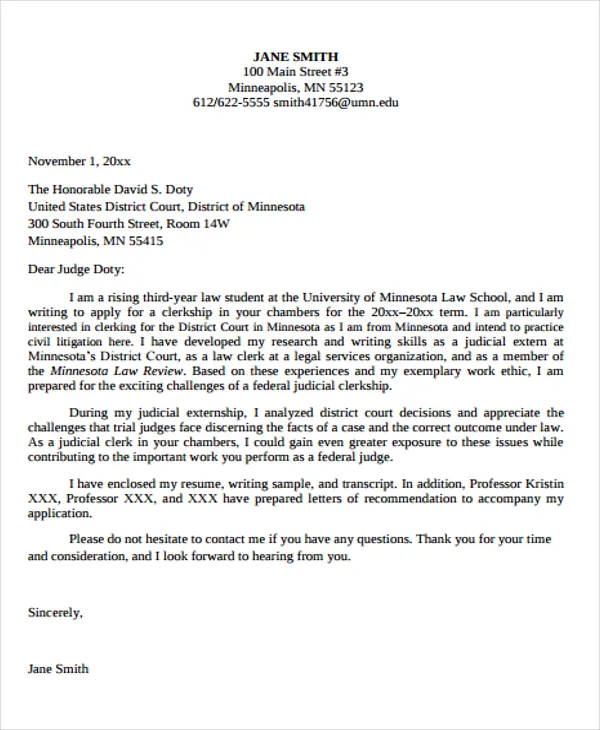
A compelling cover letter must include several key components to capture the reader’s attention. First, the contact information, including your name, address, phone number, and email address, should be at the top. Next, address the hiring manager by name whenever possible. Your opening paragraph should make a strong first impression, clearly stating the position you’re applying for and expressing your enthusiasm. The body of the letter should highlight your qualifications and skills, showcasing relevant legal experience, academic achievements, and your passion for the law. Always use professional language and maintain a consistent tone. Finally, end with a powerful closing paragraph, expressing gratitude and offering to follow up. Proofread your letter meticulously to avoid any errors.
Contact Information
Your contact information is your first chance to make a professional impression. It should be at the top of your cover letter. Include your full name, current address, phone number, and professional email address. Ensure your email address is appropriate for professional correspondence. It’s best to avoid informal or unprofessional email addresses. This information allows the employer to easily contact you, so accuracy is critical. Double-check that all details are correct before submitting your application. Keep the formatting clear and easy to read. This ensures that the hiring manager can effortlessly find and use your contact details.
The Proper Formatting of a Cover Letter
Proper formatting is essential for a cover letter, ensuring it looks professional and is easy to read. Use a standard font, such as Times New Roman, Arial, or Calibri, with a font size between 11 and 12 points. Maintain consistent margins (typically 1 inch on all sides) and use single spacing within paragraphs and double spacing between paragraphs. Align the text to the left, except for your contact information and the date, which should be aligned to the left. Keep the letter concise, ideally one page in length. Use clear headings and bullet points to break up the text and make it more scannable. Proofread carefully for any formatting inconsistencies or errors.
Address the Hiring Manager by Name
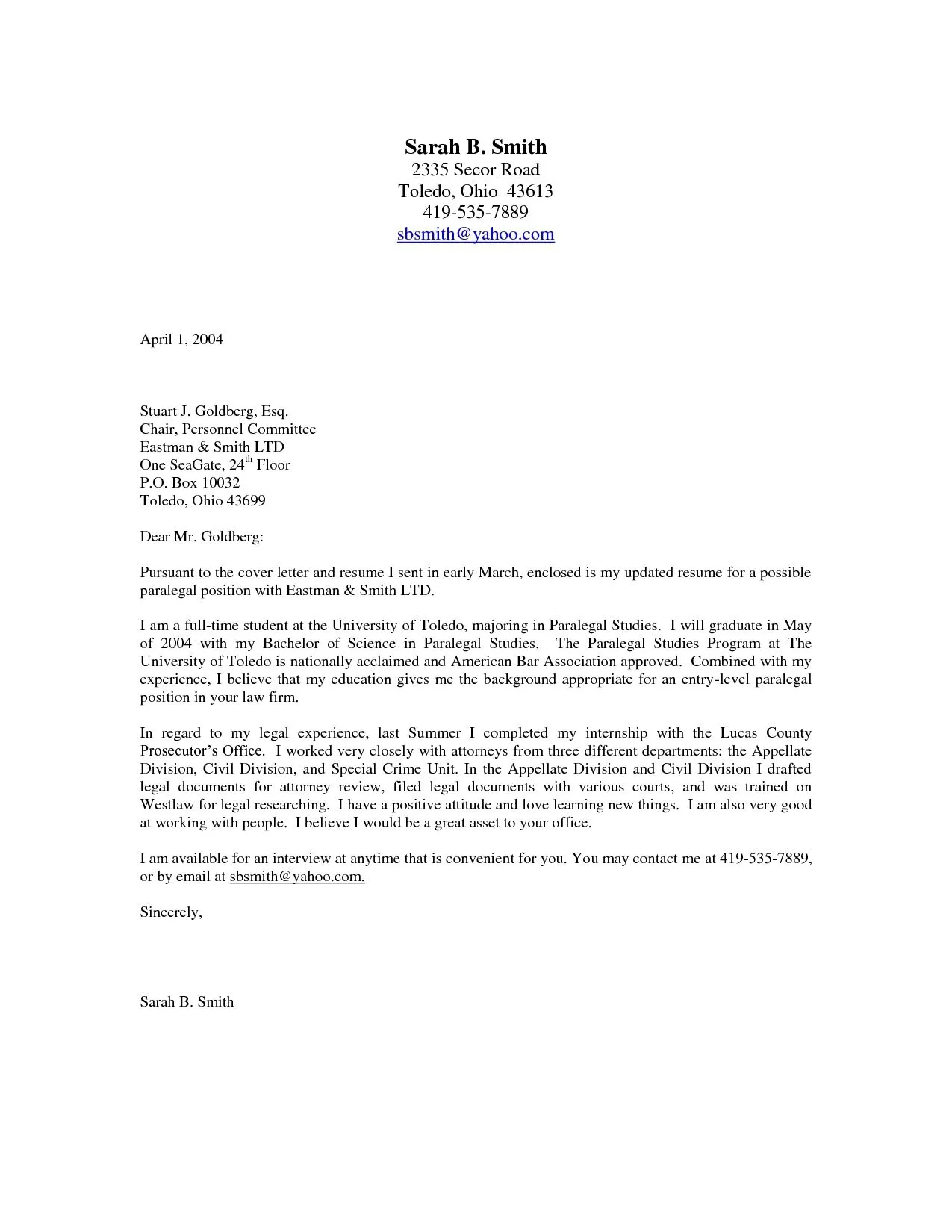
Addressing the hiring manager by name demonstrates that you have taken the time to research the company and personalize your application. It shows initiative and attention to detail. If the hiring manager’s name is available, use it in the salutation. If you can’t find a name, use a professional greeting such as “Dear Hiring Manager.” Avoid generic greetings like “To Whom It May Concern,” which can make your letter seem impersonal. Researching the hiring manager’s name often involves checking the company website, LinkedIn, or contacting the company directly. Using the correct name signals your genuine interest in the position.
Opening Paragraph Making a Strong First Impression
The opening paragraph is your first opportunity to capture the reader’s attention. Start by clearly stating the position you’re applying for and where you found the job posting. Briefly express your enthusiasm for the opportunity and the firm. Highlight a key skill or experience that aligns with the job requirements. You might also mention something specific that attracted you to the firm or the role. Keep it concise and engaging, avoiding generic phrases. Your goal is to immediately grab the reader’s attention and make them want to read further. Demonstrate your understanding of the firm’s values and the role’s responsibilities right from the start.
Highlighting Your Qualifications and Skills
The body of your cover letter should showcase your qualifications and skills relevant to the job. Focus on the requirements outlined in the job description. Provide specific examples from your academic and professional experiences that demonstrate your abilities. Quantify your achievements whenever possible. Explain how your skills and experiences align with the firm’s needs. Be sure to mention any relevant coursework, internships, or extracurricular activities. Use action verbs to describe your responsibilities and accomplishments. Tailor your examples to match the specific role and the firm’s values. This section should provide the details of your key skills, abilities and the reason why you are a good fit for the role.
Showcasing Relevant Legal Experience
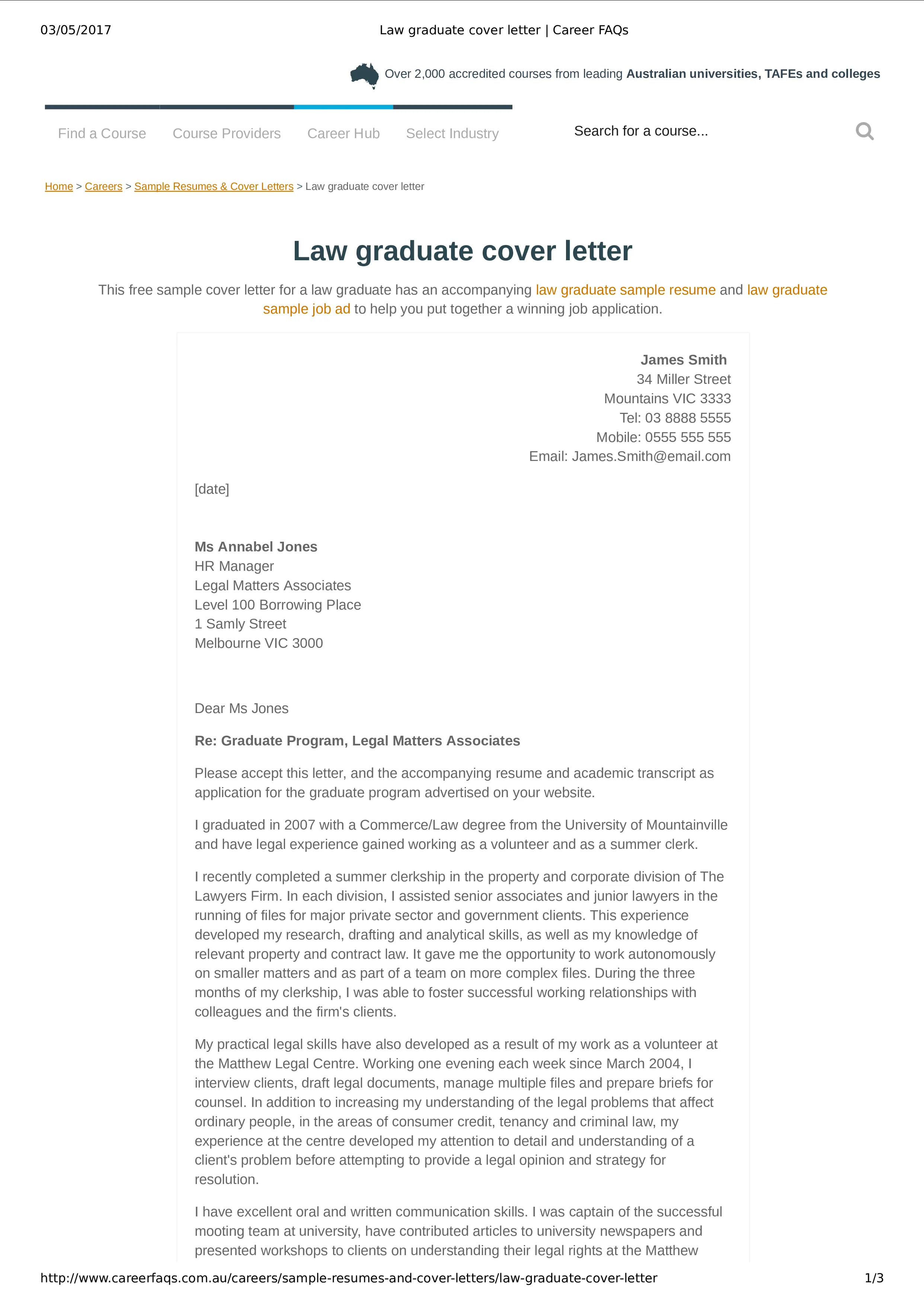
If you have any relevant legal experience, highlight it prominently. This could include internships, clerkships, volunteer work, or any part-time jobs in the legal field. Describe your responsibilities and the skills you developed in each role. Mention any cases or projects you worked on, emphasizing your contributions and the outcomes. Quantify your achievements whenever possible, such as the number of cases handled, research projects completed, or clients assisted. Use action verbs to describe your accomplishments and the impact you made. Tailor your descriptions to match the requirements of the job you are applying for. Focus on skills such as legal research, writing, analysis, and client communication.
Academic Achievements and Honors
Highlight your academic achievements and any honors you received during your law school studies. Mention your GPA if it is above average, and include any relevant honors, scholarships, or awards. Showcase any specializations or areas of expertise you have. Highlight your participation in law journals, moot court, or other academic activities. Emphasize any academic achievements that demonstrate your aptitude for the law and your commitment to excellence. Tailor your descriptions to the specific role and the firm’s focus. For example, if you are applying for a litigation position, highlight your moot court experience.
Demonstrating Your Passion for Law
Show your passion for the law and your enthusiasm for the specific role and the firm. Explain what attracts you to the legal profession and why you are interested in this particular area of law. Describe any personal experiences or motivations that have shaped your career aspirations. Express your understanding of the firm’s values and its impact on the legal community. Show that you have researched the firm and understand its mission. This demonstration of passion will make you stand out to employers. Use this section to convey your genuine excitement about the opportunity, making your application memorable.
Professional and Legal Skills
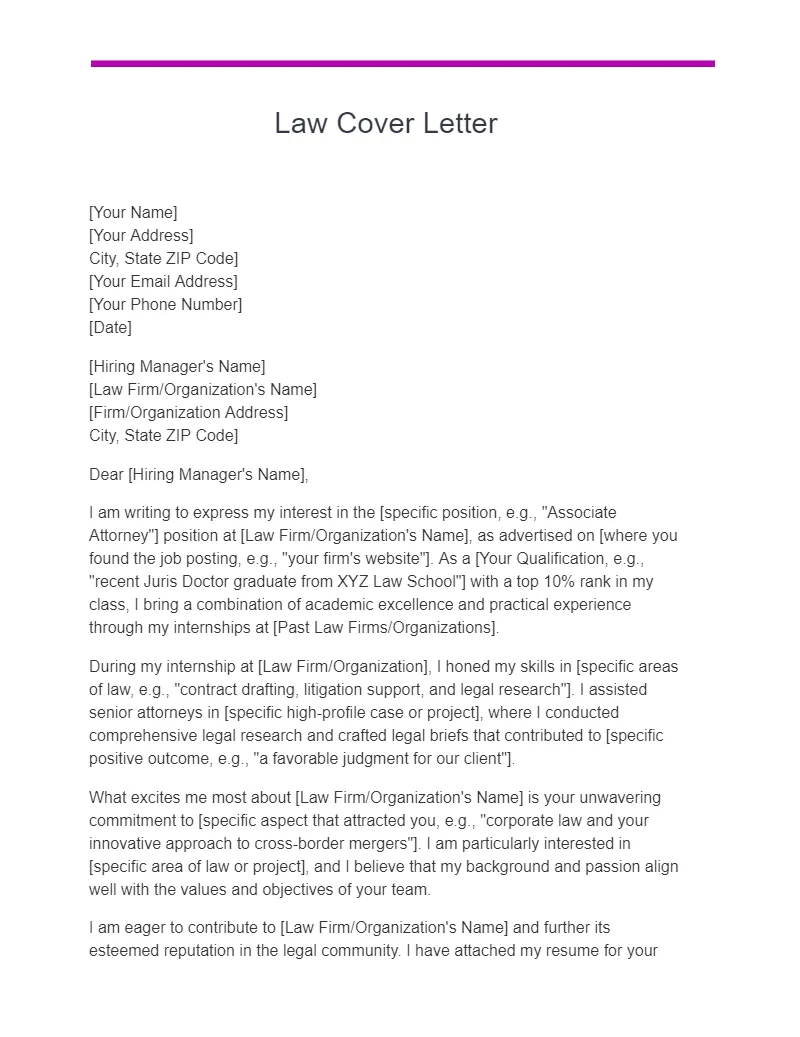
List your professional and legal skills relevant to the job. This can include legal research, writing, analysis, negotiation, communication, and advocacy. Provide specific examples of how you have used these skills in your previous experiences. Mention any software or tools you are proficient in, such as legal databases or case management systems. Tailor your skills list to match the requirements of the job description. Highlight the skills the employer is looking for. Use action verbs to describe your accomplishments and contributions. This will demonstrate to the hiring manager that you can do the job well. Be specific and provide concrete examples.
Using Keywords Strategically
Use keywords from the job description throughout your cover letter. This helps your application get noticed by applicant tracking systems (ATS) and shows that you have the desired skills and experience. Identify the key skills and qualifications mentioned in the job posting. Integrate these keywords naturally into your sentences, without sounding forced or repetitive. Make sure your keywords are relevant to the role. However, the key is not to stuff keywords, but to write a compelling cover letter that is tailored to the specific job and highlights your qualifications in a way that aligns with the employer’s needs. Don’t overdo it; let your skills and achievements speak for themselves.
Writing a Powerful Closing Paragraph
Your closing paragraph should reinforce your interest in the position and the firm. Express your gratitude for the hiring manager’s time and consideration. Restate your enthusiasm for the opportunity and briefly summarize your key qualifications. Offer to follow up by phone or email to further discuss your application. Make sure to include your contact information again. Keep it concise and professional, leaving a lasting positive impression. Always thank the reader for their time. It leaves the reader with a positive final impression. A powerful closing paragraph can make a significant difference in your job application.
Expressing Gratitude and Offering Follow-up
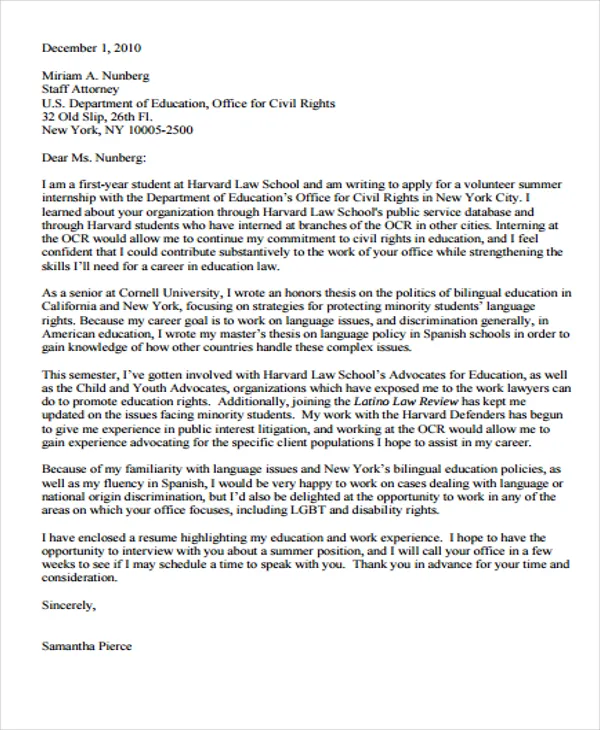
Express your gratitude for the hiring manager’s time and consideration. Thank them for reviewing your application. Offer to follow up by phone or email to discuss your qualifications further. Indicate your availability for an interview. Providing your contact information ensures it’s easy for them to reach out. This demonstrates your interest in the position. This shows you’re proactive and eager to learn more. It reinforces your professionalism and dedication to the job. A polite and professional closing ensures you leave a positive impression.
Proofreading and Editing for Perfection
Proofread your cover letter meticulously to eliminate any errors. Errors can detract from your professionalism and make you appear careless. Check for typos, grammatical errors, and spelling mistakes. Ensure your sentences are clear, concise, and well-structured. Read your cover letter aloud to catch any awkward phrasing. Have a friend, mentor, or career counselor review your letter for feedback. Pay close attention to detail, ensuring your cover letter is perfect. A polished cover letter leaves a lasting impression.
Common Mistakes to Avoid
Avoid common mistakes that can undermine your application. These include generic cover letters, typos and grammatical errors, and ignoring the job description. Make sure your cover letter is tailored to each job you apply for. Proofread carefully to catch any errors. Pay attention to the job description and include information that aligns with the job requirements. Avoid clichés and jargon. Writing a strong cover letter means avoiding the mistakes that make applications get rejected. Being mindful of these common pitfalls can significantly enhance your chances of success.
Generic Cover Letters
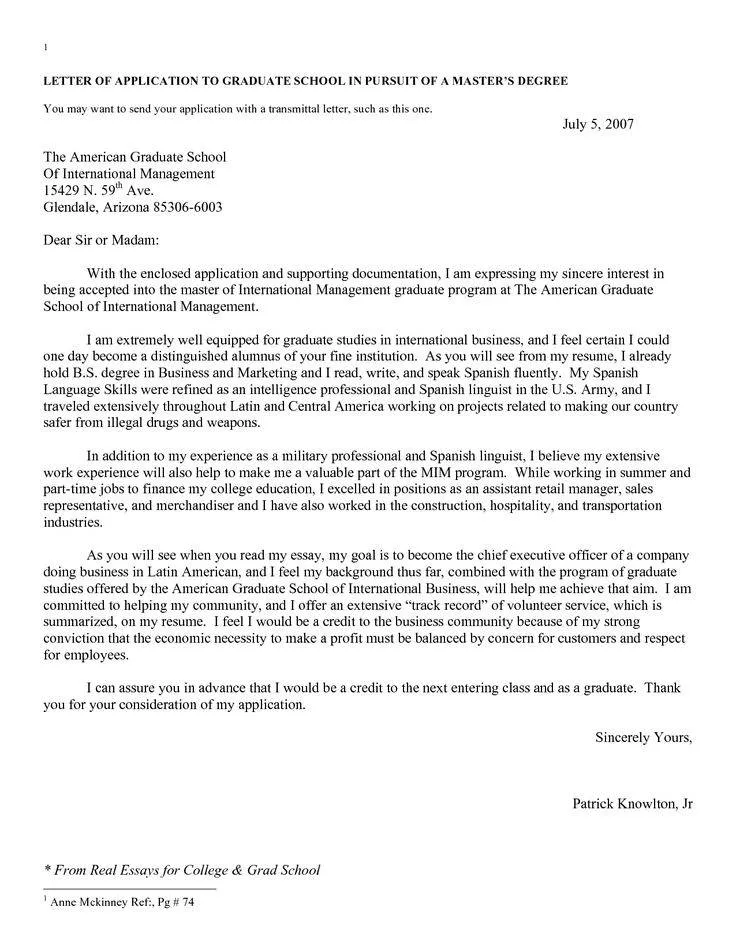
Avoid using generic cover letters that are not tailored to the specific job or firm. A generic cover letter shows a lack of interest and attention to detail. Instead, customize each cover letter to match the requirements of the job description and the values of the firm. Research the firm and the role, and tailor your letter to show how your skills and experience align with their needs. Address the hiring manager by name whenever possible. Highlight specific skills and experiences mentioned in the job posting. A personalized cover letter shows genuine interest and significantly increases your chances of getting noticed.
Typos and Grammatical Errors
Typos and grammatical errors can undermine your credibility and professionalism. They indicate a lack of attention to detail and can create a negative impression. Proofread your cover letter carefully to catch any errors. Use spell-check and grammar-check tools, but don’t rely on them entirely. Read your cover letter aloud to catch any awkward phrasing or sentence structure issues. Have a friend or mentor review your letter for feedback. A clean, error-free cover letter demonstrates your commitment to quality and attention to detail.
Ignoring the Job Description
Failing to address the job description is a critical mistake. The job description outlines the skills, experience, and qualifications the employer is seeking. Your cover letter should specifically address these requirements and demonstrate how your qualifications align with the job. Review the job description carefully and highlight the relevant skills and experiences you possess. Provide specific examples to support your claims. Tailor your cover letter to showcase your ability to fulfill the requirements of the role. Ignoring the job description shows a lack of attention to detail and can lead to your application being overlooked.
Adapting Your Cover Letter for Different Roles
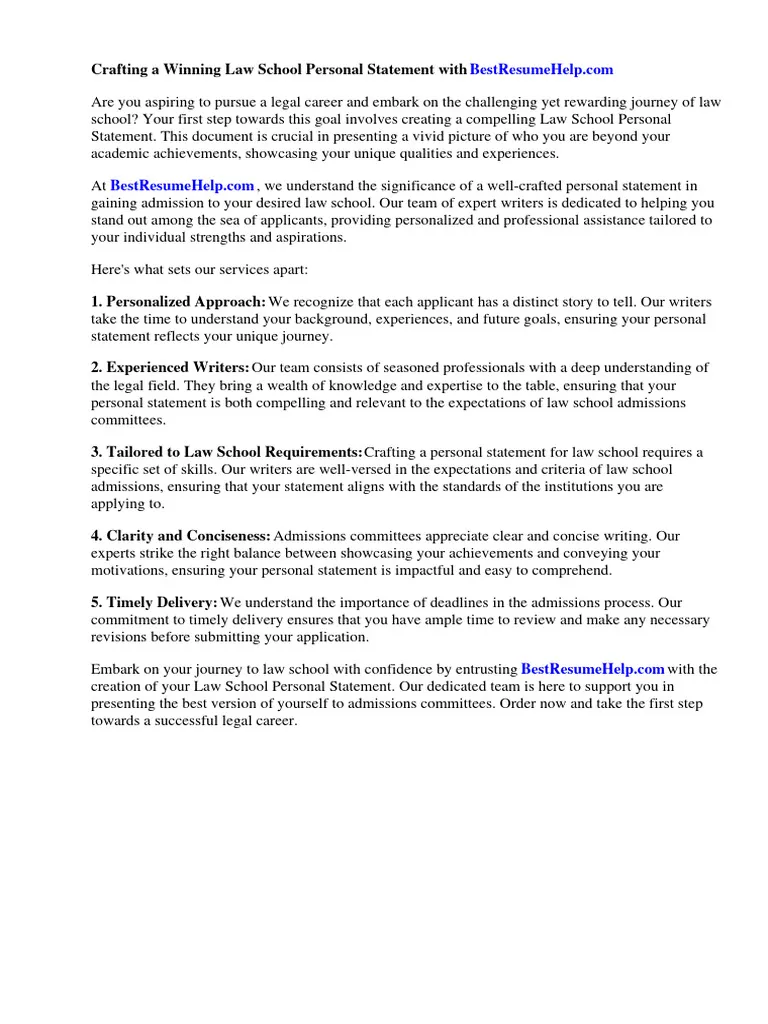
Adapt your cover letter to suit different roles and firms. Tailor your cover letter to the specific job description and the firm’s values. Highlight the skills and experiences that are most relevant to each position. Research the firm’s culture and goals, and adjust your tone and language accordingly. For each application, customize your letter to show why you are a good fit. Consider creating a template that you can adapt for different roles, but ensure each letter is unique and reflects your genuine interest in that opportunity. A well-adapted cover letter is an essential tool for showing employers you’re a good match for their specific needs.
Tailoring Your Letter to Specific Opportunities
Tailor your cover letter to each specific opportunity. Don’t use a generic cover letter for every job application. Customize your letter by highlighting skills and experiences that match the job description. Research the firm and tailor your letter to show how your goals align with their values. Use keywords from the job posting. Personalize the letter to show you understand the role and are excited about the opportunity. A tailored cover letter demonstrates your interest in the particular position and is essential for making a strong impression.
Examples of Successful Law Graduate Cover Letters
Review examples of successful law graduate cover letters to get ideas and inspiration. Look for letters that effectively highlight the candidate’s qualifications, experiences, and passion for the law. Pay attention to the structure, formatting, and language used. Analyze how the candidate addresses the hiring manager, highlights relevant skills, and demonstrates their enthusiasm for the position. Use these examples as a guide to craft your own cover letter. Modify them to reflect your unique experiences and achievements. By studying successful examples, you can learn how to make your cover letter stand out and increase your chances of success. These cover letters have been proven to work.
